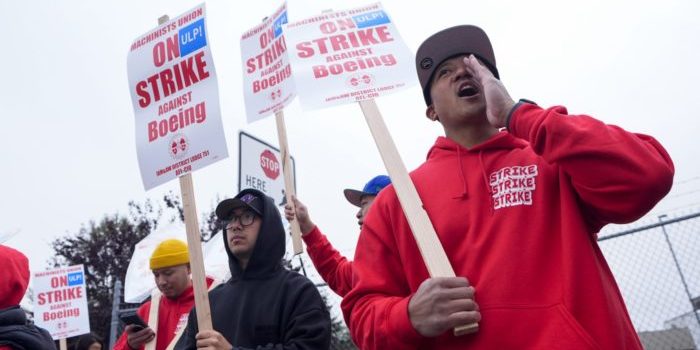(Headline USA) Boeing told employees Monday that it planned to freeze hiring and reduce travel and was considering temporary layoffs to save cash during a factory workers’ strike that began last week.
The troubled company said the moves, which include reduced spending on suppliers, were necessary because “our business is in a difficult period.”
The strike comes as Boeing already faces a public-relations and regulatory nightmare stemming from the alarming malfunction that caused one of its doors to blow off mid-flight in January.
The publicity and subsequent investigations by the Federal Aviation Administration, which demanded that the company implement serious procedural reforms in its manufacturing process, led to a major dip in the stock for the aviation heavyhitter.
Adding insult to injury, in June a pilot flight as part of the company’s new spacecraft project left two astronauts stranded at the International Space Station.
With their shuttle having left without them for safety reasons, the Starliner crew will need to hitch a ride home on one of Elon Musk’s SpaceX flights, although it is unclear if they will be able to do so before next February.
In Monday’s memo to employees, Boeing Chief Financial Officer Brian West detailed 10 immediate cutbacks resulting from the strike. They include a freeze on hiring across all levels, pausing pay increases for managers and executives who get promoted, and stopping all travel that isn’t critical.
“We are also considering the difficult step of temporary furloughs for many employees, managers and executives in the coming weeks,” West said.
Boeing’s business is in a difficult spot, he said, adding: “This strike jeopardizes our recovery in a significant way.”
About 33,000 workers represented by the International Association of Machinists and Aerospace Workers began a strike early Friday. The walkout came after workers rejected an offer of a 25% increase in pay over four years. The union originally sought a pay hike of at least 40%.
Representatives of the company and the union were scheduled to meet Tuesday with federal mediators. The union has started to survey its members to learn what they want most in a new contract.
Striking workers are picketing at several locations around Washington state, Oregon and California.
Outside Boeing’s huge factory in Everett, Washington, Nancie Browning, a materials-management specialist at Boeing for more than 17 years, said last week’s offer was worse than the one that prompted a two-month strike in 2008. She said that without annual bonuses that workers have come to depend on, the proposed pay increase was more like 9%, not 25%.
“We just want a piece of the pie like everybody else,” she said. “Why should we work all this overtime and bust our backs while these guys [Boeing executives] are sitting sitting up in their suites just raking in the cash?”
The bonuses have emerged as a flash point for union members. Workers say they range from $3,000 to $5,000 a year.
Boeing says it is hard to calculate bonuses in a way that is fair to 33,000 people who perform different jobs. So instead, the company proposes to ditch the payouts and replace them with automatic contributions of $4,160 per year to each employee’s 401(k) retirement account.
Workers are bitter that in contract extensions over the past 16 years, Boeing ended its traditional pension plan and lowered health care benefits.
“We want our pension back,” said Jacob Bustad, a machinist with Boeing for 14 years who was also on the picket line in Everett. “We just keep losing and we never gain, while the people at the top just get more and more money. Boeing has done really good for me and my family, but these last years have been hard.”
Boeing has lost more than $25 billion since the start of 2019, and burned through $4.3 billion in the second quarter of 2024 alone as it stood poised to post another money-losing year. The strike will delay deliveries of new planes, which are an important source of cash for the company.
Stephanie Pope, the head of Boeing’s commercial-airplanes division, cited the company’s $60 billion in total debt in urging blue-collar workers to accept the contract offer last week. She called it the best offer Boeing had ever made—and endorsed by the union’s local president and negotiators.
But workers rejected the recommendation of their own leaders, which had not happened since 1995.
Additional cost-cutting moves spelled out in the chief financial officer’s memo included eliminating first- and business-class service for anyone on travel that is deemed critical, and stopping spending on outside consultants.
West also said Boeing planned to make “significant reductions in supplier expenditures” and will stop most supplier purchase orders related to the 737, 767 and 777 airplane models.
After the strike started, Moody’s put Boeing on review for a possible credit downgrade, and Fitch said a strike longer than two weeks would make a downgrade more likely. Both agencies rate Boeing debt one notch above non-investment or junk status.
Adapted from reporting by the Associated Press

